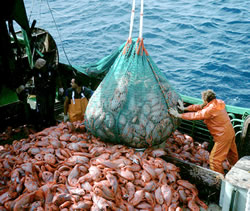Much of Palkovacs' discussion focuses on the implications of our interest in the largest specimens of fish; whether by choice or in order to obey the law, fishermen generally throw the smallest individuals back. From an evolutionary point of view, this suggests that it should pay to be small and to reproduce as early as possible in order to improve the chances of avoiding capture and consumption, as well as maximizing the likelihood of breeding before being caught. Indeed, these are the very patterns found in fisheries around the world. While fishing bans and the creation of conservation areas might help population sizes recover from heavy fishing, these techniques will not address the evolutionary impacts of fishing practices; it may take much longer for fish to "recover" the ability to grow to larger sizes and breed later in life, since the genes that drive these traits appear to be disappearing from wild populations. Thus, fishing practices can leave a "legacy...even after demographic sustainability has been achieved."
(Industrial fishing of orange roughy, Hoplostethus atlanticus)
Although some might argue that it's better to have more, smaller fish than no fish at all, that may not necessarily be true. Palkovacs describes how aquatic food webs are highly size-structured, meaning that imbalances in the numbers of fish in each size class can have "trophic cascades" that affect a multitude of other organisms elsewhere in these complex webs. If biomass suddenly becomes concentrated at a particular trophic level--in this case, a lower level where small individuals need to eat relatively large amounts of even smaller prey in order to meet their dietary needs--then more mouths will be competing for the same amount of food. Some of these mouths will be attached to organisms that are not directly impacted by fishing but, via these trophic relationships, may suffer indirectly.
Another indirect effect of overfishing is altered ecological relationships. Palkovacs points out that potential prey species have evolved to detect, avoid encounters with, and escape from, predators. However, when fishing practices remove these predators from the habitat, former prey species will suddenly find themselves living together in rather large numbers, free from the natural selective pressures of being hunted. Under these new circumstances, vigilance and evasiveness will be less important than the ability to outcompete school-mates for access to food, shelter, and mate resources. As a result, we should see the gradual evolution of traits that help individuals outperform conspecifics. This, in turn, should also affect availability of prey items, thus further amplifying the trophic cascades initiated by removing large predators.
(Historical image of a commercial fishing catch.)
Thus, Palkovacs writes, human-driven evolution is "intertwined" with population, community, and ecosystem processes, all of which "underlie prevailing definitions of overfishing." Without taking an eco-evolutionary view of the current status of our fisheries, he argues, it is difficult to adequately define "overfishing" and, therefore, decide whether we have achieved sustainability or still have work to do in the quest to ensure the health of our aquatic ecosystems.
---
Palkovacs, Eric P. 2011. The overfishing debate: an eco-evolutionary perspective. Trends in Ecology and Evolution 26(12): 616-617.
Thanks to the following webpages for providing the images used in this post:
http://wwl.panda.org/on_the_ground/success_stories/?156322/Norway-forces-EU-to-reduce-cod-discards
http://blog.lib.umn.edu/kokt0010/occfishing/


No comments:
Post a Comment